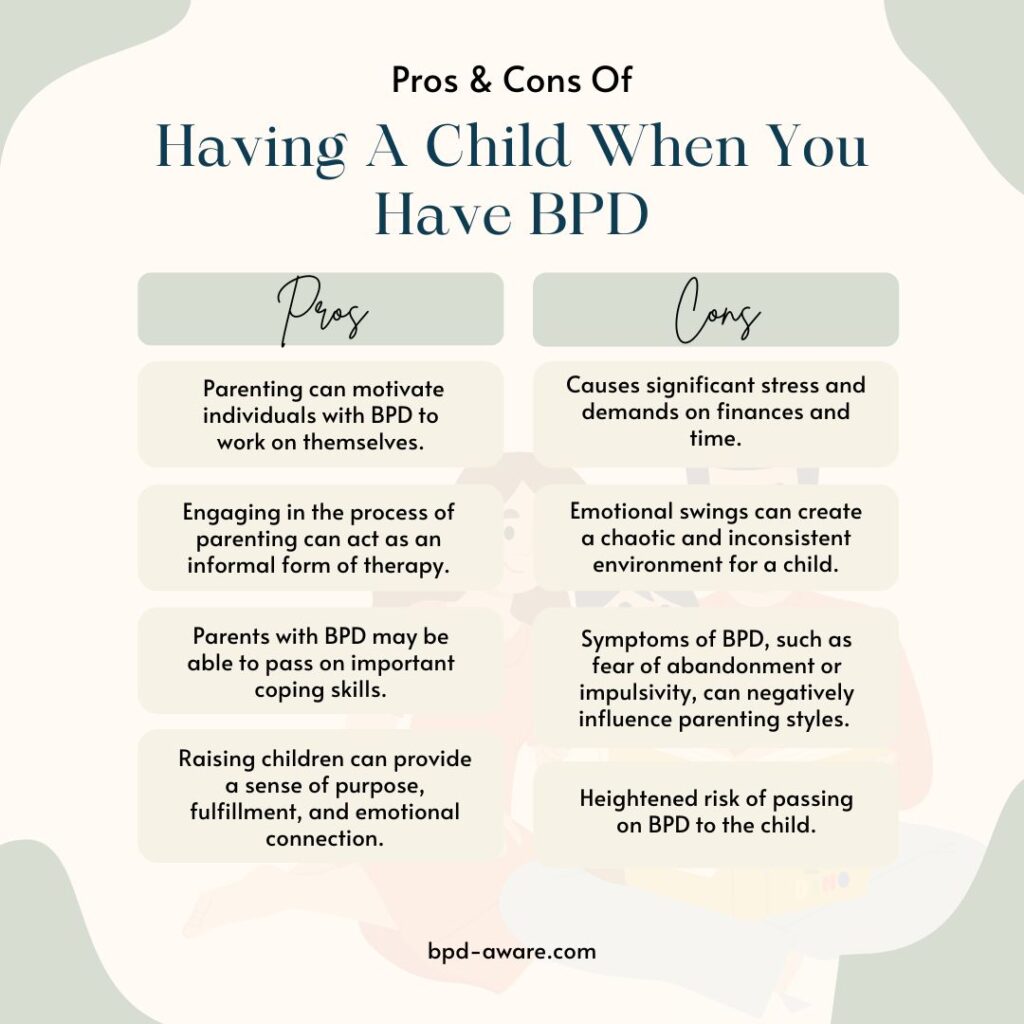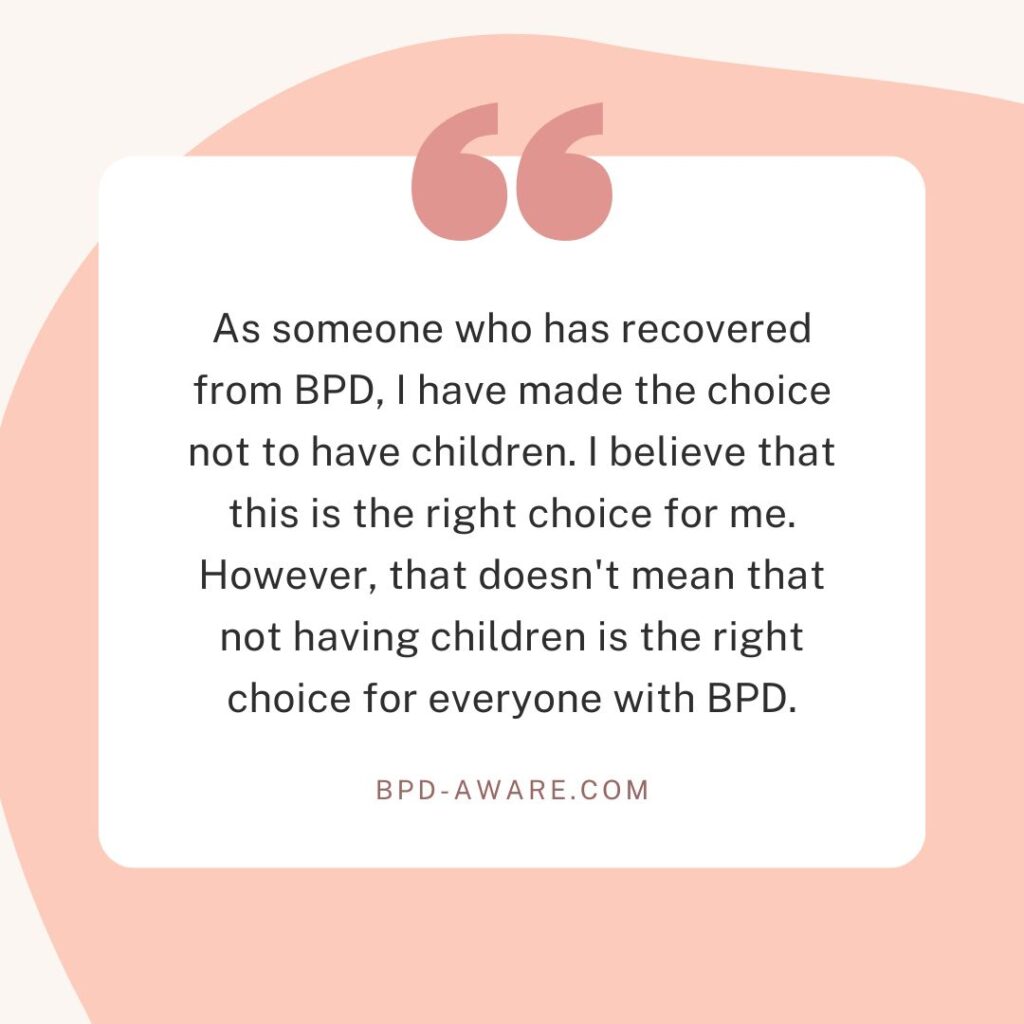One of the questions I often see being asked about Borderline Personality Disorder (BPD) is whether it’s a bad idea for people with BPD to have kids. With BPD being so tough to live with and caring for children being so challenging, it’s certainly a valid question and it’s also a sensitive one.
For many, bringing a child into the world and caring for it is a sign of maturity and ability to be responsible. However, it can be just as mature and responsible to decide not to have children. It’s natural to want to have children but the specter of BPD can weigh heavily on your mind as you make your decision.
In this article, we’ll look at the pros and cons of having children when you have BPD, the impact BPD can have on both the parent and the child, and how to make an informed decision about having a child.
Potential Benefits of Parenting For People With BPD
The first potential benefit of parenting for people with BPD is the most obvious one. You get to bring a life into this world, nurture that life, and watch it grow. This is a profoundly enriching experience that can be very beneficial to your mental health.
Having a child can also endow you with a sense of purpose and responsibility towards your mental health. You now aren’t just trying to heal and recover for your own sake, you have a child to consider. This can provide all the motivation necessary to work on yourself, attend therapy, and recover from BPD.
Raising children can also help strengthen your support network. People tend to rally around friends and family when they have a child, offering them whatever support they can. This feeling of community and emotional connection can be deeply beneficial to someone with BPD.
The Challenges of Parenting With BPD
Raising a child, teaching them right from wrong, helping them through life’s ups and downs, and watching them grow into an adult can be one of the most rewarding experiences anyone has. But it’s not without its challenges.
The emotional demands of parenting are high, as are the demands of having BPD. You’ll have to deal with tantrums, outbursts, mood swings, defiance, and other challenging behavior. You might think that having BPD would be good preparation for having children, in that respect. However, when you pile emotional demands on top of emotional demands it’s rarely a good thing. While you may have a high level of resilience for these demands, there’s a strong chance there’ll be times when they’ll completely crush you and trigger a severe BPD episode.
Parenting is also physically draining, something that many people don’t consider when they think about parenting. Your sleep patterns are likely to be greatly disturbed when the child is younger, something which can trigger BPD symptoms. Likewise, the constant care and supervision a young child needs is incredibly demanding.
There are also other aspects to consider such as the demands on your time and the financial demands. Even if you’re financially stable now, can you take the hit of having a child and the multitude of expenses that will bring? Can you mentally cope with having little time to spend on yourself?
Parents also open themselves up to a certain degree of judgment and criticism. Every parenting decision you make will be judged, whether rightly or wrongly, by people in your life. Are you able to cope with this level of judgment?
Finally, you will likely be tying yourself to your parenting partner for the rest of your life. If there are any cracks in your relationship or doubts about them as a person, having a child won’t cover up those cracks or remove those doubts. It’ll only amplify them.
If this all sounds negative and tough, it’s because parenting is very challenging, even without factoring in a mental health condition as serious as Borderline Personality Disorder. If you’re not up to the task, then it can have dire consequences for your relationship with your partner, your mental health, and the upbringing of your child.

Will You Pass BPD Onto Your Child?
When considering whether or not it’s a good idea to have a child when you have BPD, it’s important to take into account the possibility you may pass BPD onto your child.
Research has shown that BPD has a heritability rate of 46%. That means that roughly half of all cases of Borderline Personality Disorder are believed to be predominantly caused by genetic factors, rather than those of environment or random chance.
The environment also has to be considered when asking if you will pass BPD on to your child. How stable are you and how stable do you believe you can be around your child? An unstable environment will undoubtedly have a negative impact on your child. Likewise, children tend to learn the behavior they see exhibited around them. If one, or both, of their parents struggle to contain their emotions or react to things in unhealthy ways, this is something a child will see as normal and model their own behavior on.
Even if you’ve recovered from BPD and you raise your child without any impact from BPD, there’s still always the chance they might develop it. However, it’s important to remember that every child has a certain level of risk of being born or developing some form of mental or physical issue. There’s no realistic way to protect a child from everything.
But you know how hard it is to live with BPD, is that something you’re willing to risk passing on to your child?
Making an Informed Decision
We’ve looked at many of the factors that need to be considered while contemplating having kids when you have BPD. We know that there are both potential drawbacks and benefits to having children.
So, how do you make an informed decision on such an important question?
First, you need to perform some serious soul-searching and self-assessment. This means evaluating your stability and where you are in your recovery from BPD. Have you fully recovered from BPD? Are you making progress? Is every day still a battle? Unless you’ve made at least significant progress towards recovery, bringing a child into your situation is likely not the best option for either you or the child.
You also need to be abundantly aware of what triggers the worst of your symptoms. If sleepless nights, stress, anxiety, financial demands, or not having enough time for yourself trigger your BPD, having a child is not likely to be a good choice.
Beyond self-assessment, it can also be a good idea to ask people in your support network, as well as any mental health professionals you are seeing, if they believe you’re ready to have a child. Listen to them and what they have to say. Don’t fall into the trap of only hearing what you want to hear.
You should also consider what you would do if your BPD becomes less manageable. Do you have that strong support network that can help you through tough times or would you have to go through it alone? As the saying goes, it takes a village to raise a baby. Do you have that village behind you?

Final Thoughts
Hopefully, this article has given you some things to think about that will help you make the correct choice in whether or not to have a child. Such a delicate question as whether people with BPD should have kids can never truly be answered in such an article because the answer, like so much in life, is multifaceted.
As someone who has recovered from BPD, I have made the choice not to have children. I believe that this is the right choice for me. However, that doesn’t mean that not having children is the right choice for everyone with BPD.
People with BPD can make great parents and have children who are empathetic, compassionate, and a pleasure to be around. If you can genuinely manage your BPD, while having a child can make it more difficult, you might be ready to raise a child.
Remember, even parents who have never suffered from a mental health condition make mistakes. There is no one true perfect path to being a good parent and an ideal upbringing surely doesn’t exist. All a parent can do is provide a stable environment, love, and support to their child.
Sources, Resources, and Further Reading
- The Parenting Experience of Those With Borderline Personality Disorder Traits: Practitioner and Parent Perspectives: https://www.frontiersin.org/journals/psychology/articles/10.3389/fpsyg.2020.01913/full
- Borderline Personality Disorder: Challenges During the Perinatal Period: https://medicine.umich.edu/dept/psychiatry/news/archive/202307/borderline-personality-disorder-challenges-during-perinatal-period
- Should [people with BPD] have children?: https://www.reddit.com/r/BPD/comments/17vmh1l/should_we_have_children/
- The Borderline Mother and Her Child: A Couple at Risk: https://psychiatryonline.org/doi/10.1176/appi.psychotherapy.2013.67.2.153
- Children of Mothers with Borderline Personality Disorder: Identifying Parenting Behaviors as Potential Targets for Intervention: https://pmc.ncbi.nlm.nih.gov/articles/PMC3268672/
















